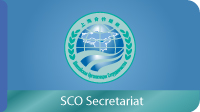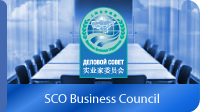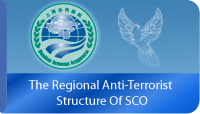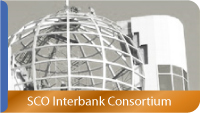|
|
 |
| SCO goal: leaders’ club or serious international mechanism? |
| 09.03.2011 12:13 |
|
|
|
|
This year, the Shanghai Cooperation Organization will celebrate its tenth anniversary. Since its emergence, the SCO has turned into an active and respected regional organization, with many countries showing their interest in it. It has achieved significant success in coordinating the efforts of its member states to ensure regional security. They cooperate in the military sphere, conduct multilateral antiterrorist exercises; their special services exchange sensitive information, coordinate a joint list of terrorist organizations and together fight drug trafficking. There are some achievements in such areas of cooperation as the economy, culture and education, although they are fewer.
At the same time, it is becoming increasingly clear that today sets new tasks for the organization. Its fate depends on whether it is able to respond to current challenges and cope with existing problems, overhauling its work. In fact, the question the SCO is facing today is whether it will be developing as a club of leaders and ministers, where there is little real work done between meetings and high-profile statements or it will be able to become a serious international mechanism active in all spheres and with an influence comparable to that of such “big brothers” as ASEAN or APEC, or perhaps, even exceeding theirs.
Problem of SCO’s expansion
Until recently, all members of the SCO and most experts believed that the number of its participants should not be increased for the time being, since it should first be established as it is, set straight its mechanisms and gain experience. There was an unspoken agreement not to admit new members. It was unspoken because, in fact, it contradicted the SCO Charter, which declared that the organization was open.
Meanwhile, interest in the SCO in the world was growing. In 2006, Pakistan, which had the status of an observer, applied for accession as a full member. Another observer, Iran, followed suit in 2007 and 2008. In 2010, yet another observer, India, said it wanted to become a full member.
The meeting of the SCO Heads of State Council in Tashkent in June 2010 endorsed the Resolution on the procedure of admitting new members. The document clearly sets criteria a new member should meet.
The SCO summit in Astana is expected to adopt a standard memorandum, which will be the last step in creating the official framework for accepting new members. After that, it will be difficult to reject aspirants, citing the absence of necessary documents.
Russia’s position is related to its active support to India as a candidate for a full member in the SCO. It was spelled out in a joint Russian-Indian declaration on expanding strategic partnership, which was signed by the two countries’ leaders during Indian Prime Minister Manmohan Singh’s official visit to Russia upon invitation from President Dmitry Medvedev in December 2009.
Admission of such a big and generally successfully developing country as India would seriously increase the SCO’s international authority and influence. The great power’s international weight and scale would contribute to making the SCO the world’s biggest international organization for the aggregate population of its members after the United Nations. It would significantly increase its political weight and economic attractiveness among developing countries, since the successful Chinese development model would be supplemented with the Indian one, which is perhaps no less successful.
It would also assist in resolving a number of problems the organization is facing. One of the SCO’s main goals is to intensify cooperation in Central Asia. Russia actively cooperates with China within the SCO in achieving these goals, with Beijing acknowledging Russia’s traditional interests in the region, and Moscow welcoming China’s stabilizing economic presence.
India’s interests in Central Asia fully coincide with those of the SCO member states, and its development goals are quite in line with the organization’s tasks. India is a secular state that is actively fighting ethnic nationalism, separatism and religious extremism. It has experienced the threat of terrorism. In recent decades, India has been successfully developing its economy, and its unique economic model, which is oriented towards the domestic market and has shown its advantages during the latest global crisis, could supplement other attractive development models of the SCO member states.
India’s admission would seriously contribute to stabilizing the situation and accelerating economic development of Central Asian states. India has a long history of relations with the region. There was time when Central Asia, Afghanistan and northern parts of India were within one state. Today, India continues developing active trade and economic ties with Central Asia and makes solid investment here. Strengthening of its economic position in the region would not contradict the interests of other SCO members, but would serve the common purpose – the region’s economic development, simultaneously balancing the growing economic influence of the West, especially, of the European Union.
India could make a big contribution to the SCO’s efforts to stabilize the situation in Afghanistan and to resolve related problems. It has already invested over $1 billion in Afghanistan reconstruction projects and could seriously support the SCO programs seeking to stabilize the Afghan economy.
At present, the country most opposed to India’s admission to the SCO is China. It cites a number of arguments, first of all, that the fairly young SCO, after admitting such a large country, will face numerous organizational problems that will be difficult to resolve, its appearance will change drastically, and the decision-making process, which is already not easy, will become even more difficult. In the past, Russia agreed to this argument, by the way, but later reconsidered its position.
Overall, this is all true. Indeed, the organization will have to introduce a third language – English – and expand the Secretariat, RCTS, etc. But, given India’s significant financial potential, all these problems can be resolved. Most probably, India will have a quota in the SCO’s permanent bodies that will be equal to those of Russia and China, but it will also contribute a corresponding sum to the organization’s budget.
On a broader scale, Russia and China that are seen as the SCO’s leaders simply because of their size, will of course have to share their influence in the organization. But this requires a strategic decision. What is more important, one’s own influence within the SCO or the growth of the organization’s influence in the world? It would seem that the latter is much more important.
This was the train of thought followed by the most influential international alliances – NA TO, EU and ASEAN – when deciding on expansion. Their expansions did bring about some problems, with bureaucracy increasing, the consensus being more difficult to achieve when making decisions, the level of manageability and pace of decisionmaking somewhat declining. The balance of forces within the organizations also changed, sometimes not in favor of their founders. Nevertheless, positive results surpassed the negative ones. Similarly, admission of Pakistan, which officially applied for the SCO entry before India, should be welcome as well. Of course, its economic role within the SCO would not be as big as that of India. However, Pakistan is playing a key part in regulating the situation in Afghanistan and has a significant economic and political influence in the region.
Of course, bringing Indian-Pakistani disagreements to the SCO would be a challenge for the young organization. At the same time, it should be remembered that both India and Pakistan are members of the South Asian Association for Regional Cooperation (SAAR C) which doesn’t hinder its functioning. Recently, the SCO has been actively involved in resolving problems related to Afghanistan. Naturally, these problems can hardly be considered without embracing Afghanistan itself. In this connection, it seems that the existing mechanism of the SCO – Afghanistan contact group is no longer sufficient, and it is time to think of giving Afghanistan at least the status of an observer.
Expansion and organizational reform
Opponents of the SCO’s expansion often argue that the more members, the more difficult it is to manage the organization and the less efficient its staff. This is not always so. The SCO staff has been prone to insufficient efficiency from the very beginning and the organization’s expansion, paradoxically, may create an incentive for its reform. Admission of new members will already mean serious changes, and these members will look at the organization of the permanent bodies from a fresh perspective.
What is the perceived problem of the SCO’s permanent bodies, first of all, its Secretariat? The Secretariat based in Beijing is not exactly an independent body of an international organization, pursuing its own policy. It is a conglomerate of representatives of its member states, with each country’s foreign ministry able to send or withdraw any employee there at any time. Naturally, such employees are subordinated more to their own foreign ministries, often represented by the national coordinator, than to the Secretary General. Any minor issue like a trip to an event in another country or appropriation of a small sum from the budget has to be coordinated with the Council of foreign ministers.
However, the experience of the most efficient international organizations (UN , EU, ASEAN , etc) shows that employees of their permanent bodies should be international officials, they should not depend on their countries’ governments. The SCO Secretariat urgently needs a reform in this area. The following measures are required to achieve this: 1) the SCO Secretariat should be given the right to dispose of the organization’s budget without consulting the Foreign Ministers Council or the member states’ foreign ministries; 2) all positions within the Secretariat should be filled on a competitive basis.
A special commission should be set up for this purpose. A contract with a person employed this way should be subject to cancelling only by the Secretariat as the employer if it is not satisfied with the worker, not by the desire of a member state’s foreign ministry.
Another relevant organizational issue is the reform of the decision-making process. Already today, the formal understanding of consensus allows Uzbekistan to actually block cooperation in the economic and cultural spheres. Tashkent flatly refuses to participate in educational programs (notably, the SCO University) and in the SCO Youth Council. Of course, the positions of all SCO member states should be respected, but on the other hand, the lack of interest in joint projects on the part of one member, should not block the possibility of cooperation between the rest. Here it is possible to learn from the experience of other international organizations. For example, the EU history shows that expansion results in gradual abolition of the principle of consensus.
Expansion and economy
Economic cooperation is the weakest area of the SCO’s activities. There are virtually no multilateral economic projects. President Medvedev pointed to the need to intensify economic cooperation within the SCO both at the Yekaterinburg summit in 2009 and at the Tashkent summit in 2010.
Involvement of such big economies as India and Pakistan could become an incentive to develop economic cooperation within the SCO and to launch multilateral projects.
The main reason for stalled economic cooperation is the absence of a mechanism to finance multilateral projects. The SCO’s budget is too modest and it is not meant for these purposes. Talk about setting up a SCO Fund or a Development Bank has been going on for a long time, but it is yet to be set up. Russia suggests a Development Fund (a special account) as a mechanism to finance pre-project work, first of all in such sectors as energy, transportation and high technology. It implies that the implementation of these projects will be financed by the SCO Interbank Consortium. This position comes from the belief of some Russian ministries that in case a bank is set up, China, which has huge financial possibilities, will dominate it,while Russia would prefer to actively use the Eurasian Development Bank that was set up within the Eurasec and where Russia’s share is significantly higher than that of other participants.
This position seems short-sighted. A SCO bank with China’s participation would have far more financial possibilities than the Eurasian Development Bank (where the only other active member besides Russia is Kazakhstan), and part of its funds could go to projects in Russia. It seems that it is in Russia’s interests to agree to the setup of a SCO Development Bank, making sure that China and Russia contribute equally to its capital (like they do to the SCO budget) and, consequently, have an equal number of votes.
|
|
* Реестр иностранных средств массовой информации, выполняющих функции иностранного агента:
Голос Америки, Idel.Реалии, Кавказ.Реалии, Крым.Реалии, Телеканал Настоящее Время, Azatliq Radiosi, PCE/PC, Сибирь.Реалии, Фактограф, Север.Реалии, Радио Свобода, MEDIUM-ORIENT, Пономарев Лев Александрович, Савицкая Людмила Алексеевна, Маркелов Сергей Евгеньевич, Камалягин Денис Николаевич, Апахончич Дарья Александровна, Medusa Project, Первое антикоррупционное СМИ, VTimes.io, Баданин Роман Сергеевич, Гликин Максим Александрович, Маняхин Петр Борисович, Ярош Юлия Петровна, Чуракова Ольга Владимировна, Железнова Мария Михайловна, Лукьянова Юлия Сергеевна, Маетная Елизавета Витальевна, The Insider SIA, Рубин Михаил Аркадьевич, Гройсман Софья Романовна, Рождественский Илья Дмитриевич, Апухтина Юлия Владимировна, Постернак Алексей Евгеньевич, Общество с ограниченной ответственностью Телеканал Дождь, Петров Степан Юрьевич, Istories fonds, Шмагун Олеся Валентиновна, Мароховская Алеся Алексеевна, Долинина Ирина Николаевна, Шлейнов Роман Юрьевич, Анин Роман Александрович, Великовский Дмитрий Александрович, Альтаир 2021, Ромашки монолит, Главный редактор 2021, Вега 2021
* Сведения реестра НКО, выполняющих функции иностранного агента:
Фонд защиты прав граждан Штаб, Институт права и публичной политики, Лаборатория социальных наук, Фонд по борьбе с коррупцией, Альянс врачей, НАСИЛИЮ.НЕТ, Мы против СПИДа, Фонд защиты прав граждан, СВЕЧА, Гуманитарное действие, Открытый Петербург, Феникс ПЛЮС, Лига Избирателей, Правовая инициатива, Гражданская инициатива против экологической преступности, Фонд борьбы с коррупцией, Гражданский Союз, Российский Красный Крест, Центр Хасдей Ерушалаим, Центр поддержки и содействия развитию средств массовой информации, Горячая Линия, В защиту прав заключенных, Институт глобализации и социальных движений, Центр социально-информационных инициатив Действие, ВМЕСТЕ, Благотворительный фонд охраны здоровья и защиты прав граждан, Благотворительный фонд помощи осужденным и их семьям, Фонд Тольятти, Новое время, Серебряная тайга, Так-Так-Так, центр Сова, центр Анна, Проект Апрель, Самарская губерния, Эра здоровья, правозащитное общество Мемориал, Аналитический Центр Юрия Левады, Издательство Парк Гагарина, Фонд имени Андрея Рылькова, Сфера, Центр защиты СИБАЛЬТ, Уральская правозащитная группа, Женщины Евразии, Рязанский Мемориал, Екатеринбургское общество МЕМОРИАЛ, Институт прав человека, Фонд защиты гласности, Российский исследовательский центр по правам человека, Дальневосточный центр развития гражданских инициатив и социального партнерства, Пермский региональный правозащитный центр, Гражданское действие, Центр независимых социологических исследований, Сутяжник, АКАДЕМИЯ ПО ПРАВАМ ЧЕЛОВЕКА, Частное учреждение Совета Министров северных стран, Центр развития некоммерческих организаций, Гражданское содействие, Центр Трансперенси Интернешнл-Р, Центр Защиты Прав Средств Массовой Информации, Институт развития прессы - Сибирь, Фонд поддержки свободы прессы, Гражданский контроль, Человек и Закон, Общественная комиссия по сохранению наследия академика Сахарова, Информационное агентство МЕМО. РУ, Институт региональной прессы, Институт Развития Свободы Информации, Экозащита!-Женсовет, Общественный вердикт, Евразийская антимонопольная ассоциация, Чанышева Лилия Айратовна, Сидорович Ольга Борисовна, Таранова Юлия Николаевна, Туровский Александр Алексеевич, Васильева Анастасия Евгеньевна, Ривина Анна Валерьевна, Бурдина Юлия Владимировна, Бойко Анатолий Николаевич, Гусева Ольга Андреевна, Дугин Сергей Георгиевич, Пивоваров Андрей Сергеевич, Писемский Евгений Александрович, Аверин Виталий Евгеньевич, Барахоев Магомед Бекханович, Шевченко Дмитрий Александрович, Жданов Иван Юрьевич, Рубанов Роман Викторович, Шарипков Олег Викторович, Мальсагов Муса Асланович, Мошель Ирина Ароновна, Шведов Григорий Сергеевич, Пономарев Лев Александрович, Каргалицкий Борис Юльевич, Созаев Валерий Валерьевич, Исакова Ирина Александровна, Исламов Тимур Рифгатович, Романова Ольга Евгеньевна, Щаров Сергей Алексадрович, Цирульников Борис Альбертович, Халидова Марина Владимировна, Людевиг Марина Зариевна, Федотова Галина Анатольевна, Паутов Юрий Анатольевич, Верховский Александр Маркович, Пислакова-Паркер Марина Петровна, Кочеткова Татьяна Владимировна, Чуркина Наталья Валерьевна, Акимова Татьяна Николаевна, Золотарева Екатерина Александровна, Рачинский Ян Збигневич, Жемкова Елена Борисовна, Гудков Лев Дмитриевич, Илларионова Юлия Юрьевна, Саранг Анна Васильевна, Захарова Светлана Сергеевна, Аверин Владимир Анатольевич, Щур Татьяна Михайловна, Щур Николай Алексеевич, Блинушов Андрей Юрьевич, Мосин Алексей Геннадьевич, Гефтер Валентин Михайлович, Симонов Алексей Кириллович, Флиге Ирина Анатольевна, Мельникова Валентина Дмитриевна, Вититинова Елена Владимировна, Баженова Светлана Куприяновна, Исаев Сергей Владимирович, Максимов Сергей Владимирович, Беляев Сергей Иванович, Голубева Елена Николаевна, Ганнушкина Светлана Алексеевна, Закс Елена Владимировна, Буртина Елена Юрьевна, Гендель Людмила Залмановна, Кокорина Екатерина Алексеевна, Шуманов Илья Вячеславович, Арапова Галина Юрьевна, Пастухова Анна Яковлевна, Прохоров Вадим Юрьевич, Шахова Елена Владимировна, Подузов Сергей Васильевич, Протасова Ирина Вячеславовна, Литинский Леонид Борисович, Лукашевский Сергей Маркович, Бахмин Вячеслав Иванович, Шабад Анатолий Ефимович, Сухих Дарья Николаевна, Орлов Олег Петрович, Добровольская Анна Дмитриевна, Королева Александра Евгеньевна, Смирнов Владимир Александрович, Вицин Сергей Ефимович, Золотухин Борис Андреевич, Левинсон Лев Семенович, Локшина Татьяна Иосифовна, Орлов Олег Петрович, Полякова Мара Федоровна, Резник Генри Маркович, Захаров Герман Константинович
* Единый федеральный список организаций, в том числе иностранных и международных организаций, признанных в соответствии с законодательством Российской Федерации террористическими:
Высший военный Маджлисуль Шура, Конгресс народов Ичкерии и Дагестана, Аль-Каида, Асбат аль-Ансар, Священная война, Исламская группа, Братья-мусульмане, Партия исламского освобождения, Лашкар-И-Тайба, Исламская группа, Движение Талибан, Исламская партия Туркестана, Общество социальных реформ, Общество возрождения исламского наследия, Дом двух святых, Джунд аш-Шам, Исламский джихад, Аль-Каида, Имарат Кавказ, АБТО, Правый сектор, Исламское государство, Джабха аль-Нусра ли-Ахль аш-Шам, Народное ополчение имени К. Минина и Д. Пожарского, Аджр от Аллаха Субхану уа Тагьаля SHAM, АУМ Синрике, Муджахеды джамаата Ат-Тавхида Валь-Джихад, Чистопольский Джамаат, Рохнамо ба суи давлати исломи, Террористическое сообщество Сеть, Катиба Таухид валь-Джихад, Хайят Тахрир аш-Шам, Ахлю Сунна Валь Джамаа
* Перечень общественных объединений и религиозных организаций в отношении которых судом принято вступившее в законную силу решение о ликвидации или запрете деятельности:
Национал-большевистская партия, ВЕК РА, Рада земли Кубанской Духовно Родовой Державы Русь, Асгардская Славянская Община Асгардской Веси Беловодья, Славянская Община Капища Веды Перуна, Мужская Духовная Семинария Староверов-Инглингов, Нурджулар, К Богодержавию, Таблиги Джамаат, Русское национальное единство, Национал-социалистическое общество, Джамаат мувахидов, Объединенный Вилайат Кабарды, Балкарии и Карачая, Союз славян, Ат-Такфир Валь-Хиджра, Пит Буль, Национал-социалистическая рабочая партия России, Славянский союз, Формат-18, Благородный Орден Дьявола, Армия воли народа, Национальная Социалистическая Инициатива города Череповца, Духовно-Родовая Держава Русь, Русское национальное единство, Древнерусской Инглистической церкви Православных Староверов-Инглингов, Русский общенациональный союз, Движение против нелегальной иммиграции, Кровь и Честь, О свободе совести и о религиозных объединениях, Омская организация Русское национальное единство, Северное Братство, Клуб Болельщиков Футбольного Клуба Динамо, Файзрахманисты, Мусульманская религиозная организация п. Боровский, Община Коренного Русского народа Щелковского района, Правый сектор, Украинская национальная ассамблея, Украинская повстанческая армия, Тризуб им. Степана Бандеры, Украинская организация «Братство», Свидетели Иеговы, О противодействии экстремистской деятельности, РЕВТАТПОД, Артподготовка, Штольц, В честь иконы Божией Матери Державная, Сектор 16, Независимость, Организация футбольных болельщиков «Фирма», Молодежная правозащитная группа МПГ, Курсом Правды и Единения, Каракольская инициативная группа, Автоград Крю, Союз Славянских Сил Руси, Алля-Аят, Благотворительный пансионат Ак Умут, Русская республика Русь, Арестантское уголовное единство, Башкорт, Нация и свобода, W.H.С., Фалунь Дафа, Иртыш Ultras, Русский Патриотический клуб-Новокузнецк/РПК, Сибирский державный союз, Фонд борьбы с коррупцией, Фонд защиты прав граждан, Штабы Навального
|






















Leave a comment